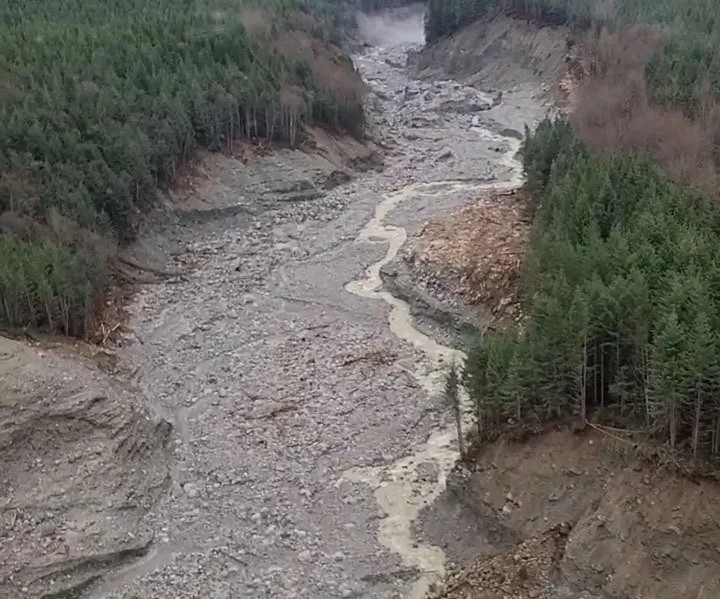
Massive B.C. landslide imperils dwindling salmon stocks: First Nations chief
An enormous landslide that tore through a remote valley in B.C.'s Central Coast region and spilled into Bute Inlet in November has put the beleaguered salmon stocks in the area at further risk, according to the elected chief of the local First Nation.
Homalco First Nation Chief Darren Blaney is planning to visit the slide area — about 120 kilometres north of Powell River and 220 kilometres northwest of Vancouver — by helicopter on Wednesday, but he told CBC News it's clear from photos that the slide was extremely destructive, pushing boulders down the valley and crushing dislodged trees.
WATCH BELOW: LANDSLIDE IS SEVERELY AFFECTING FISH POPULATION, IMPACTING FIST NATIONS
Blaney said the effects on chum, coho and pink salmon would add to the already dwindling stocks seen in recent years.
"As the salmon stocks continue to decline, we're getting concerned about food security," he said. "Our chum stocks have declined. A year ago we only got 1,200 of our 4,000 allocation of chum and our chum stocks have been getting less and less reliable."
Homalco First Nation's unceded territory extends from Campbell River on Vancouver Island across the Discovery Islands, and up Bute Inlet on the mainland to the Homathco Icefield.
Scientists believe the Nov. 28 landslide began in the Coast Mountains, when an initial outflow into a glacial lake caused a huge wave, which then caused an outburst flood sending millions of cubic metres of mud and debris into Elliot Creek, then Southgate River, and finally into Bute Inlet and the ocean.
When Blaney saw images of the damage, his first thought was the salmon; there would have been eggs in the gravel spawning grounds in the river.
"It's one of our more productive river systems ... for chum, and coho and pinks as well, so it's a big loss for us," he said. "I'm not sure what kind of spawning beds will be left."
But the effects of the landslide aren't his only concern for wild salmon.
Blaney said his nation is also consulting with Department of Fisheries and Oceans officials on the effect of salmon farms in the Discovery Islands and he's concerned about a problem with sea lice.
But he said with the type of support federal officials have shown in the case of the Big Bar landslide that obstructed salmon runs in the Fraser River, the Southgate River salmon can be saved.
"I think it's going to take quite a few years to rebuild it," he said. "The salmon, given the chance, are pretty resilient."
This article, written by Rafferty Baker, was originally published for CBC News.





